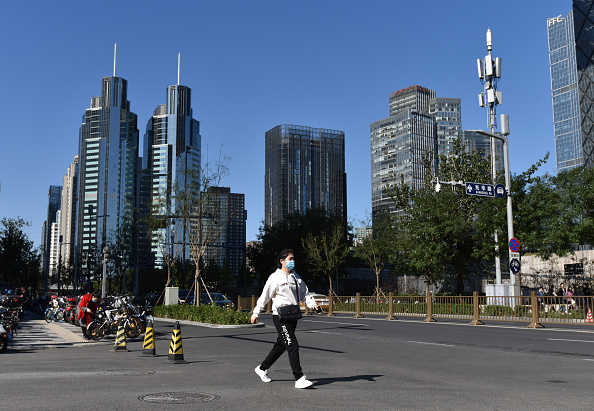
 An Uncertain Future
An Uncertain FutureAt a press conference marking his first year in office, U.S. President Joe Biden said it is too soon to lift U.S. tariffs on Chinese goods, despite calls from U.S. businesses to relieve the duties. U.S. Trade Representative Katherine Tai is "working on that right now," Biden said, but "the answer is uncertain." China has reached only about 60 percent of its pledge under the two-year trade agreement enacted by the Trump administration to buy $200 billion in additional U.S. goods and services by the end of 2021.
"Since the agreement came into effect, China has worked hard to overcome multiple adverse factors caused by the impact of a pandemic, the global recession and supply chain disruptions, and pushed for the implementation of the deal from both sides," Commerce Ministry spokesperson Shu Jueting said, referring to Beijing's commitments under the Phase 1 trade deal. Shu also emphasized that China hopes the U.S. can create favorable conditions to expand trade cooperation.
Meanwhile, China's economic output slowed to 4 percent in the last quarter of 2021, as home buyers and consumers became increasingly cautious, creating warning signs for the global economy. China's growth was a deceleration from the 4.9 percent growth in the third quarter, and it's anticipated that after a record year for coal production in order to ease the country's power shortage crisis, China will need even more fossil fuels to power economic recovery.
Learn more in, "Economic Tides," an interview with Larry Summers, former U.S. Treasury Secretary and former president of Harvard University.
 Demographic Dilemma
Demographic DilemmaChina's population growth rate has fallen to its lowest level in six decades, with births barely outnumbering deaths in 2021 despite major government efforts to increase population growth and stave off a potential economic crisis. The demographic slowdown means that the number of people of working age is declining in proportion to those too old to work.
Beijing has announced major reforms to address the issue, including raising the retirement age. A three-child policy initially sparked a slight increase in births after it replaced the two-child policy that was introduced in 2016, before falling again.
Chinese state media presented a silver lining, promoting the fact that China's population grew to 1.4126 billion by the end of last year, registering a 480,000 increase compared with the end of 2020.
Read more in "Implications of an Older Population," by Li Zheng, an Assistant Research Professor at the China Institutes of Contemporary International Relations.
 Provocative Actions
Provocative ActionsClaims of sovereignty and national security remain high priorities for Beijing and Washington, as the world's two largest economies battle for military and economic competitiveness amidst rapidly growing relational tensions. Earlier this week, the Chinese military accused a U.S. warship of "provocative actions," claiming they had tracked it through disputed waters in the South China Sea without the Chinese government's permission, and warned of "serious consequences." China's navy and air forces followed and monitored the ship, but the U.S. navy emphasized that its mission was in accordance with international law and said China's statement was "false." The mission was also in alignment with the "freedom of navigation" missions frequently carried out by the U.S. to challenge Chinese territorial claims in the South China Sea.
Meanwhile in the U.S., the Biden administration is continuing to ramp up scrutiny on Chinese technology, to fight for its own dominance in the tech industry and to combat potential national security threats. Washington is currently probing e-commerce giant Alibaba's cloud business to determine if it poses any security risks to the U.S., checking on how the company stores U.S. clients' data and if it could be accessed by the Chinese government. At the same time, it's been reported that U.S. federal agencies have been secretly tracking WhatsApp users in China and Macau with no explanation, under a surveillance law from the 1980's.
National and individual security concerns are also persisting with the Beijing Winter Olympics right around the corner, as researchers recently revealed security flaws in the mandatory smartphone app athletes must use to report health and travel data while in Beijing for the Games. The portion of the app that contains personal data failed to "verify the signature used in encrypted transfers," though representatives from Beijing's Olympics organizing committee have emphasized that there are no critical vulnerabilities to the app and that it is there to meet the needs of the athletes.
Prepared by China-US Focus editorial teams in Hong Kong and New York, this weekly newsletter offers you snap shots of latest trends and developments emerging from China every week, while adding a dose of historical perspective.
- 2022-01-14 Digital Advances
- 2022-01-07 The Dawn of a New Political Year
- 2021-12-17 Clamp Down
- 2021-12-10 Debating Democracy
- 2021-12-03 Managing Competition
- 2021-11-19 Responsible World Leadership
- 2021-11-12 A Historic Transformation
- 2021-11-05 A Green Rivalry
- 2021-10-29 Dry Tinder
- 2021-10-22 A Diplomatic Burn
- 2021-10-15 Energy Crunch
- 2021-10-08 Stoking Tensions
- 2021-10-01 Great Power Coopetition
- 2021-09-24 Sign of Goodwill?
- 2021-09-17 State of Play
- 2021-09-10 The Last Word
- 2021-09-03 Heightened Frustrations
- 2021-08-27 China’s Backyard
